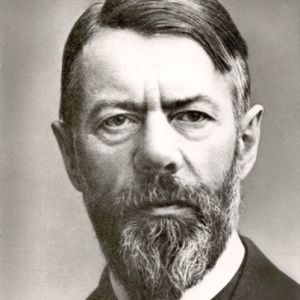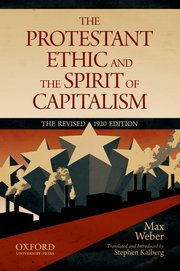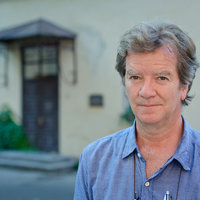I recently travelled down to the School of Management at the University of Leicester to give a talk titled ‘The stranger, the wager and the ethics of office’. With a bombast designed to obscure my lack of confidence on the topic, the abstract staked my skin in my own wager that arch post-modernist Richard Kearney and Max Weber, high priest of rationality, could somehow be made to speak to one another. In the event, though, I played it cool and confessed the project to be very much work in progress. My good colleagues at Leicester listened helpfully and offered many interesting comments questions. After glass or two of local beer and a fantastic Leicester curry to finish the evening, I returned home full of ideas and enthusiasm. Academia isn’t always such a tough job.
Here’s a lightly polished version of my notes for the talk.
‘Many thanks for inviting me here today to share some thoughts and ideas with you. The project remains at a very early-stage, but perhaps there are the makings of an interesting paper. You will have to tell me what you think.

As some of you may know, my research is inspired by Michel Callon and the performativity/market studies program, with a particular interest in market-type arrangements as organisational devices and all their attendant consequences. By consequences, I mean the moral dimensions of market-type arrangements and their effects upon personhood. You may wonder what leads a scholar of management to this particular topic. But I wasn’t always in a management school. Misspent undergraduate years as a theologian left me with abiding interest in the nature of good personhood, and a conviction that neither good nor personhood can be abstracted from context or described by universal, rational rules. You can see, I hope, how a management scholar with a background such as mine can arrive at the conclusion that organisation and personhood are irrevocably linked.
There are three unexplained phrases in the title – the stranger, the wager, and the ethics of office. I’ll work through them all, and by the end of the talk you’ll have a sense of what I’m up to, I hope. Let’s start with the ethics of office, which of course comes from the work of Max Weber, particularly as represented by du Gay (2000, 2008).
Yikes, you might say! How can Weber possibly sit with Callon’s actor network constructivism? In fact, it sits more comfortably than you might think: Callon explicitly casts his work in the Weberian tradition, for Weber the anthropologist is interested in the ethical possibilities of action open to persons placed into various life spheres, where the ethical character of individuals is determined by institutional constraints. (du Gay helps us distinguish between the anthropologically inclined Weber, and the Weber of rationalist theory whose formalist-substantivist distinction has been used to front various kinds of critical political economy, doing Weber something of a disservice in the process).
The crucial point is that for Weber, and Callon too, good character means being able to live up to the ethical standards embedded in one’s office. This idea of specific, ethical practices, irreducible to common principles, ‘appears quite foreign to those for whom a common or universal form of moral judgement is held to reside in the figure and capacities of the self-reflective person’ (du Gay 2008, 131). Weber can be seen as a late practitioner of an earlier tradition – the ethical tradition of office – where office-holders are personae, bundles of instituted rights and duties.
But there remains a problem: if ethics are embedded in particular offices, rather than the person of the moral agent, how can we talk of business ethics at all. How can we attempt to establish normative commonalities that might transcend, for example, the office of the arms dealer, or bond trader? To put that another way, how can we stop ourselves from falling into anything-goes relativism, where the sole merit attached to a job is the discharge of the technical requirements of that role?
 Yet such things do not take place in a vacuum. As Weber’s Protestant Ethic and the Spirit of Capitalism (1958) pointed out, much of the underlying ethical capacity in our contemporary economic offices stems from a secularised version of a particular Judeo-Christian worldview. Moreover, there is his strange parting shot at the end of the book ‘No one knows who will live in this [iron] cage in the future, or whether at the end of this tremendous development entirely new prophets will arise, or there will be a great rebirth of old ideas and ideals, or, if neither, mechanized petrification, embellished with a sort of convulsive self-importance.’ Hmmm.
Yet such things do not take place in a vacuum. As Weber’s Protestant Ethic and the Spirit of Capitalism (1958) pointed out, much of the underlying ethical capacity in our contemporary economic offices stems from a secularised version of a particular Judeo-Christian worldview. Moreover, there is his strange parting shot at the end of the book ‘No one knows who will live in this [iron] cage in the future, or whether at the end of this tremendous development entirely new prophets will arise, or there will be a great rebirth of old ideas and ideals, or, if neither, mechanized petrification, embellished with a sort of convulsive self-importance.’ Hmmm.
To my mind, if we recognise that a) ethical persona are constituted within offices, and therefore the search for logical, transcendent morals is fruitless, and b) the ethical framing of such offices is underwritten by a secularized narrative of covenant, then c) meaningful change, whether transformational or incremental, must be underwritten by new narratives and covenants. Moreover, I suggest that the emancipatory intent of critical management studies should be alive to such an endeavour, and we should be delighted to find Weber on our side.
***
That’s the first part of the title explained. Now I’d like to talk about Richard Kearney.
But I’m conscious of Karamali’s (2007) warning that inviting yet another thinker into the panoply – or perhaps smorgasbord – of business ethics is a form of taming, domestication, or violence, the reduction to a single idea that may or may not help business ethics to solve its impossible problems.
I’m not sure that I’m going to invite Kearney in. I’m going to leave him outside in all his wild, complex strangeness. I’m not going to force him to claim his rights in the language he doesn’t speak – an act that Derrida sees as the first violence done to the stranger.

In this case, perhaps the second act of violence, after the reply I received from the (Irish) colleague who invited me to talk today. ‘Kearney. God! He’s Irish and that explains everything he says. Catholicism in deconstruction is Catholicism nevertheless. Why does he have to have his photo taken with so many Frenchmen? It suggests something but I don’t know what.’ And this is true, on both parts: reading Kearney’s work the names of prominent post-modern philosophers drop like anvils around the reader, denoting a strange insecurity; yet Caputo (I think) insists that Kearney is a true enthusiast, enthousiasmos, from enthous ‘possessed by a god, inspired’ (based on theos ‘god’).
And that may be just too much for many of us management scholars to stomach – we may have to leave his eschatological time, his ana-theism, outside.
As Karamali points out, we have already invited post-modern thinkers and Continental philosophers into our critical-management tent, if only to muffle their voices when they come in. We have got to know Levinas through Derrida and we are familiar with his notion of the stranger. So we move here to the second part of the title, the stranger, in whose presence – through whose face (or visage) – we are subject to an ancient and terrible ethical calling. There is a famous paragraph often taken from Levinas:
‘the Face is what resists me by its opposition and not what is opposed to me by its resistance … the absolute nakedness of a face, the absolutely defenceless face, without covering, clothing or mask, is what opposes my power over it, my violence, and opposes it in absolute way, with an opposition which is positioning itself” (Levinas, Freedom and Command in Collected Philosophical Papers, page 19 to 21.)
So,
‘For Levinas, the ethical relation involves more than simply seeing the Other. It involves a recognition and openness to the face of the Other, which entails, as Derrida puts it, “a total question, a distress and denuding, a supplication, a demanding prayer” (Jones 2003, 227).
A similar argument applies to hospitality: it ceases to be genuine hospitality if it is conditional:
‘Absolute hospitality requires that open up my home and that I give not only to the foreigner… but to the absolute, unknown, anonymous other, and that I give place to them, that I let them come, and that I let them arrive and take place in the place I offer them, without asking of them either reciprocity or even their names’ (ibid, 233).
Such hospitality is a risky business. How can we navigate conflicting moral claims without reason, and some notion of the good, for example? Yet Derrida is not alone in claiming that any truly ethical response must be non-rational: Zygmunt Bauman’s Postmodern Ethics argues that to treat morality as a set of laws is to leave out what is properly moral: a moral self constituted by responsibility. So calculation, whether explained by evolution, the emergence of reciprocity, or contract, is never moral. Morality must stem from a basic moral impulse; morality is a transcendence of being.
We are stuck, then, offering ourselves as hostage to a strange and overwhelming alterity, in the face of which we cannot judge or calculate, nor hesitate. We cannot even seek to describe this responsibility without taking away from the other that strange quiddity by which we are so obliged. It seems that the radical hermeneutics of deconstruction lead to a fetishization of the Other. How are we to tell if such Others are benign or malign, enabling or disabling? It is likely, says Kearney, that the ethical experience of such an Other is one of evil, as we are ‘haunted by an alterity that can’t be comprehended or refused’.
What are we to do?
***
Kearney, has an answer for us. It is a distinctively Christian answer. We must rely upon stories: the rich tradition laid out for us in the biblical narratives, and the veracity of apostolic testimony. He maps out his proposal in the trilogy ‘Philosophy at the Limit’: On Stories, The God who May Be, and Strangers, Gods and Monsters, followed by Anatheism. His enthusiasm is to be taken seriously. Let’s not do violence to him by secularizing, or washing away the sharpness of his demands. For Kearney is a devout man. He desires love and justice; he desires God and the kingdom.
 We’re not talking here about a kind of evangelical-fantasy rapture, like those scenes in the Simpsons when the Flanders family ascend heavenwards and everyone else falls into a pit of lava.
We’re not talking here about a kind of evangelical-fantasy rapture, like those scenes in the Simpsons when the Flanders family ascend heavenwards and everyone else falls into a pit of lava.
Kearney wants us to think differently about God. It’s a move that one might term ‘post-religious’, attempting to rethink the old God of esse – of metaphysics – as a God of posse – the God who may be. The God of the Possible, he writes, is
‘much closer…to the God of desire and promise who, in diverse scriptural narratives, calls out from burning bushes, makes pledges and covenants, burns with longing in the Song of songs, fries in the wilderness, whispers in caves, comforts those oppressed and darkness, and prefers orphans, widows and strangers to the mighty and the proud’ (GMB, 2).
The divine promise, he writes, leaves the space of the possible at the core of Divinity, making the Kingdom of justice and love possible – a divine ‘perhaps’ hovering over every decision reminding us that history isn’t over and duty is never done.
The basis for ethical action remains the person of the Other. Each of us embodies a persona, an
‘eschatological aura of possibility which eludes but informs a person’s actual presence here and now… persona is all in others that exceeds my searching gaze, safeguarding their inimitable and unique singularity…to configure the other as a persona is to grasp him/her as present in absence, as both incarnate in flesh and transcendent in time’ (ibid, 10).
Reading theology again, after so many years, has reminded me of my undergraduate experiences. The words close rank, push back, become too dense for the natural disposition of a soggy, aesthetic Anglican. I am locked out. (If only I had written that in my second-year learning journal as opposed to pretending I understood what was going on!) But now and again one glimpses a crack in the wall of words, a moment of illumination and clarity. And there’s one in the moment when Kearney declares that the eschatological notion of persona vouchsafes the finality of the Other as eschaton. It refuses to let us position her as telos, as a predictable, foreseeable goal, and insists that the genuine Other is always guaranteed by a radically divine Other (SGM39). Here, as scholars of critical management, we might sit up and notice. For Kearney is offering us a narrative that transcends all others, a narrative that we can cling to as we struggle to articulate better ways of doing management: better ways of seeing, of speaking to and of valuing those around us. And Kearney’s eschaton reminds us that history is not yet done. The eschaton is a promise, a possibility, specifically ethical time; not a homogenous empty time, as Walter Benjamin puts it, because ‘at the heart of every moment of the future is contained the little door through which the Messiah may enter’. We must be alive to the ‘scandal of the transfiguring Christ’ invoking a time of miracle and grace, able to ‘undo the sins of the past while simultaneously invoking a universal kingdom that is both now and still to come’.
The kingdom Kearney imagines is not one heralded by fire and brimstone, but an invitation to a more creative life. His ‘ana-chronology’ is an ‘eschatological repetition’ able to recover the ‘gracious seeds of possibility still lurking in our midst’ (A, 15). His poetics of the possible is poetic indeed – an invitation for us, as managers, to manage as if the seeds of all possibility were contained in each and every moment of time. Who, I wonder, could refuse such an offer?

Let’s pause for a moment to think just how different this is from the Calvinist ethic that Weber identified. That ethic is based on thrift and labour, which will soon enough bring you your just deserts; a calculated self-sacrifice today in pursuit of twice as much jam tomorrow. The American chief executive sacrificing his salary to turn around a failing company is exactly what Weber had in mind. Kearney, on the other hand, follows Stanislas Breton and Gianni Vattimo as seeing the Eucharist as reminder of the divine emptying into society. It is the end of the metaphysical God beyond, and instead a hallowing of everyday, secular existence; the crazy, mad love of God pouring itself into the world so that we may witness God in ‘dappled things’, as the poet Gerald Manley Hopkins so memorably put it.
***
But we still have to choose, and here we come to the final part of my title. For Kearney, ethics is all about that moment of choice: a return to the primordial wager, an ‘invitation to revisit what might be termed a primary scene of religion: the encounter with the radical stranger who we choose, or don’t choose, to call God’ (A, 7). Making these choices is part of the daily work of building a better world, For ‘eschatology is realized in the presence of the alien in our midst’ (A, 29). In other words, the Kingdom comes neither through apocalypse, nor rapture, but through attention to our present situation by means of radical hospitality and healing.
Now, the question is, shall we invite Kearney in? How might we, as management scholars, cope with his eschatological hope? There are, I think, three possibilities.
We could ignore it altogether – simply read On Stories and talk about narrative (a move I have seen in the literature already).
We could domesticate his thinking. We could reduce the moment of wager to the pursuit of authentic moral certainty through introspection and self-examination, and turn his ana-chronology into some kind of exercise in mindfulness, a spiritually inert inner journey. That would be an easy enough road to follow, and we would end up walking alongside evangelical Christian management gurus like Ken Blanchard, and their happy marriage of prosperity and salvation.
Or, we could take him as he is, in all his enthusiasm and strangeness, and strive to manage for God’s kingdom on earth. Let’s review his central ideas: a philosophy of radical healing and hospitality, the Other guaranteed by the presence of the divine Other; an eschatological time that is capable of undoing wounds of the past and setting things right; an absolute move away from individualist means end rationalism; and a recognition of the telos embodied in the other.
Such a move might offer us a radically new perspective on the refugee crisis, for example; we might do better than we have done of late, too.
 We have to try to tell the difference, in sum, between narrative testimonies that transform or deform lives. We have a rich narrative tradition to help us in our encounter with the stranger. There are Biblical stories of uninvited guests: Abraham and the three strangers; Isaac on Mt Moriah; Mary’s trust in the angel. We could make use of revisionist biblical scholarship identifying historical Jesus as a political activist at a time of rising inequality, political oppression and exclusion, economic unfairness, and visions of the kingdom as a collective earthly achievement. Here’s some management research that has done just that. Or we could look at contemporary theologies of liberation, and exemplary figures for scholarship or practice, especially those who show the religious life as self-emptying (kenosis) through service.
We have to try to tell the difference, in sum, between narrative testimonies that transform or deform lives. We have a rich narrative tradition to help us in our encounter with the stranger. There are Biblical stories of uninvited guests: Abraham and the three strangers; Isaac on Mt Moriah; Mary’s trust in the angel. We could make use of revisionist biblical scholarship identifying historical Jesus as a political activist at a time of rising inequality, political oppression and exclusion, economic unfairness, and visions of the kingdom as a collective earthly achievement. Here’s some management research that has done just that. Or we could look at contemporary theologies of liberation, and exemplary figures for scholarship or practice, especially those who show the religious life as self-emptying (kenosis) through service.
It is a hard task, and you will see that I – stodgy Anglican and amateur theologian – lack the imagination, faith, or courage to follow it through. So I’ll leave the last words to Dietrich Bonhoeffer, the theologian whose work has inspired Kearney and many others. He wrote these words from a Nazi prison, arrested the day after his attempt to assassinate Hitler failed. Abandoning himself to the very bleakest of futures, he says:
‘It is only by living completely in this world that one learns to believe; one must abandon every attempt to attempt to make something of oneself…it is in such a life that we throw ourselves utterly into the arms of God, that we take seriously not our own but God’s suffering in the world, that we watch with Christ in Gethsemane. And that this is faith, this is repentance, and it is in this way that one becomes a man, a Christian’.
I think I’ll leave it there. Thank you very much.’
Some references, for the scholarly-minded
Kearney abbreviations:
A Anatheism. 2011. New York: Columbia University Press
GMB The God Who May Be. 2001. Bloomington: Indiana University Press.
SGM Strangers, Gods and Monsters. 2001. Abingdon: Routledge.
du Gay, Paul. 2000. In praise of bureaucracy. London: Sage.
du Gay, Paul. 2008. “Max Weber and the Moral Economy of Office.” Journal of Cultural Economy 1 (2):129-144.
Jones, Campbell. 2003. “As if Business Ethics were Possible, `within Such Limits’.” Organization 10 (2):223-248.
Karamali, Eleni. 2007. “Has the guest arrived yet? Emmanuel Levinas, a stranger in business ethics.” Business Ethics: A European Review 16 (3):313-321.
Weber, M. 1958. The Protestant Ethic and the Spirit of Capitalism. Translated Talcott Parsons. London: Routledge

2 Comments